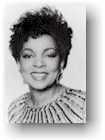Ruby
Dee: A star of stars
 Rudy
Dee is one of Black America�s premier actors. She, along with
her equally talented husband, Ossie Davis, has proven that Blacks
can withstand and survive the vagaries of Hollywood and in the
process produce and be a part of work that is of great benefit to
the Black community. Ruby Dee has starred in numerous films,
including "A Raisin in the Sun", "The Jackie
Robinson Story", "Do the Right Thing" and
"Jungle Fever". Her latest books include "In This
Life Together", an autobiography and loving tribute,
co-authored with Davis, celebrating their life and 52 years of
marriage, and "My One Good Nerve", a collection of
shorts stories and poems. Rudy
Dee is one of Black America�s premier actors. She, along with
her equally talented husband, Ossie Davis, has proven that Blacks
can withstand and survive the vagaries of Hollywood and in the
process produce and be a part of work that is of great benefit to
the Black community. Ruby Dee has starred in numerous films,
including "A Raisin in the Sun", "The Jackie
Robinson Story", "Do the Right Thing" and
"Jungle Fever". Her latest books include "In This
Life Together", an autobiography and loving tribute,
co-authored with Davis, celebrating their life and 52 years of
marriage, and "My One Good Nerve", a collection of
shorts stories and poems.
In 1988, Ms. Dee
was inducted into the Theater Hall of Fame, and in 1989 into the
NAACP Image Hall of Fame. She was awarded an Emmy for her role in
"Decoration Day", a Hallmark Hall of Fame presentation.
In 1994, Ruby Dee and Ossie Davis were given the Silver Circle
Award by the Academy of Television Arts and Sciences, and in 1995,
they were recipients of the prestigious National Medal of Arts
Award bestowed at the White House by President and Mrs. Clinton.
She was recently interviewed by contributing writer Barbara Beebee.
Final Call News (FCN): You made a comment that
the older people were going to have to be revolutionaries. What
role can older Americans perform in the activist community?
Ruby Dee (RD): We could petition those in
government to be more responsible, more compassionate. We could do
things like, for example, get the prisoners off the stock market.
We could insist on the upgrading of the public school system for
our grandchildren, because it�s in danger of being trashed.
Also, forcing those elected to change priorities in government and
the social and political arenas.
There are enough of us now to see how the
Constitution is being abused, particularly by corporate America.
We can be the Paul Reveres of our time. Not the British, but the
conglomerates are coming! Are we going to be relegated to
positions that are less significant than, say, money? � We
missed our children somewhere along the line; we weren�t there
for them. So we missed that social, spiritual rung in the ladder
that I think as a species we need to climb.
FCN: Does the cultural output of our community�our
music, art, theater�have an effect upon our behavior?
RD: Oh, yes! We�re judged by our cultural
output. It tells you a lot about the mental and spiritual
condition of this incredible, unbelievable, miraculous species
that we are. We�re (Blacks) at the forefront of struggle. I call
us the elite of the oppressed. We have a lot to share with people
about struggling for anything in this life because we�ve been
through so much of it.
FCN: Do you believe Hollywood and the media
machine are corrupting Black America�s morals?
RD: We�re responsible for and to each
other. The image-makers and those who spell out who we are and
give us our spiritual and psychic dimensions might be more aware
of the necessity to take charge and monitor those images that
poison.
FCN: What do you believe are the future roles
of Blacks in television, both cable and network, particularly now
that BET has been sold?
RD: I anticipate greater familiarity with
the literature. Black people are reading a great deal more and we�re
going to want to see some of those movies. We�re going to want
to see some of the literature on television and on stage. I think
we�re going to be more selective and demand more diverse
offerings.
FCN: You�ve managed to make it in Hollywood
without debasing yourself. How have you managed to do that, and
how has Hollywood treated you?
RD: I fit into the pattern of Hollywood�s
in and out love affair [with Blacks]. You know, Blacks are in,
Blacks are out. I�m still waiting for my big break in film. The
work that has sustained me is the work mostly generated by those
authors I�ve come to love. � The things that I have managed to
do are things that I felt I had to do because there was no other
real inclusion in Hollywood, and they were satisfying. What I want
to say by this is that there are all kinds of ways to be an actor.
I read books, I produce for off-Broadway, I write and perform
myself, I do workshops. So, it�s possible to be busy and doing
creative things. ...
FCN: Without constantly being a
"star?"
RD: Yes. This star business can be very
tricky no matter whether you�re Black or white. � I look
forward to things improving for actors, for women, for Blacks and
for our stories to strike more mature and deeper cords. As
Lorraine Hansbury said, "How dare you despairing ones think
that only you know the truth." So, I don�t dare hang my
head in a despair mode too long. I did that, and it doesn�t help
anything. You just have to look around, stick your head up through
whatever it is, take in the fresh air, and see which way the wind
is blowing for you.
FCN: Thank you. |

![]()